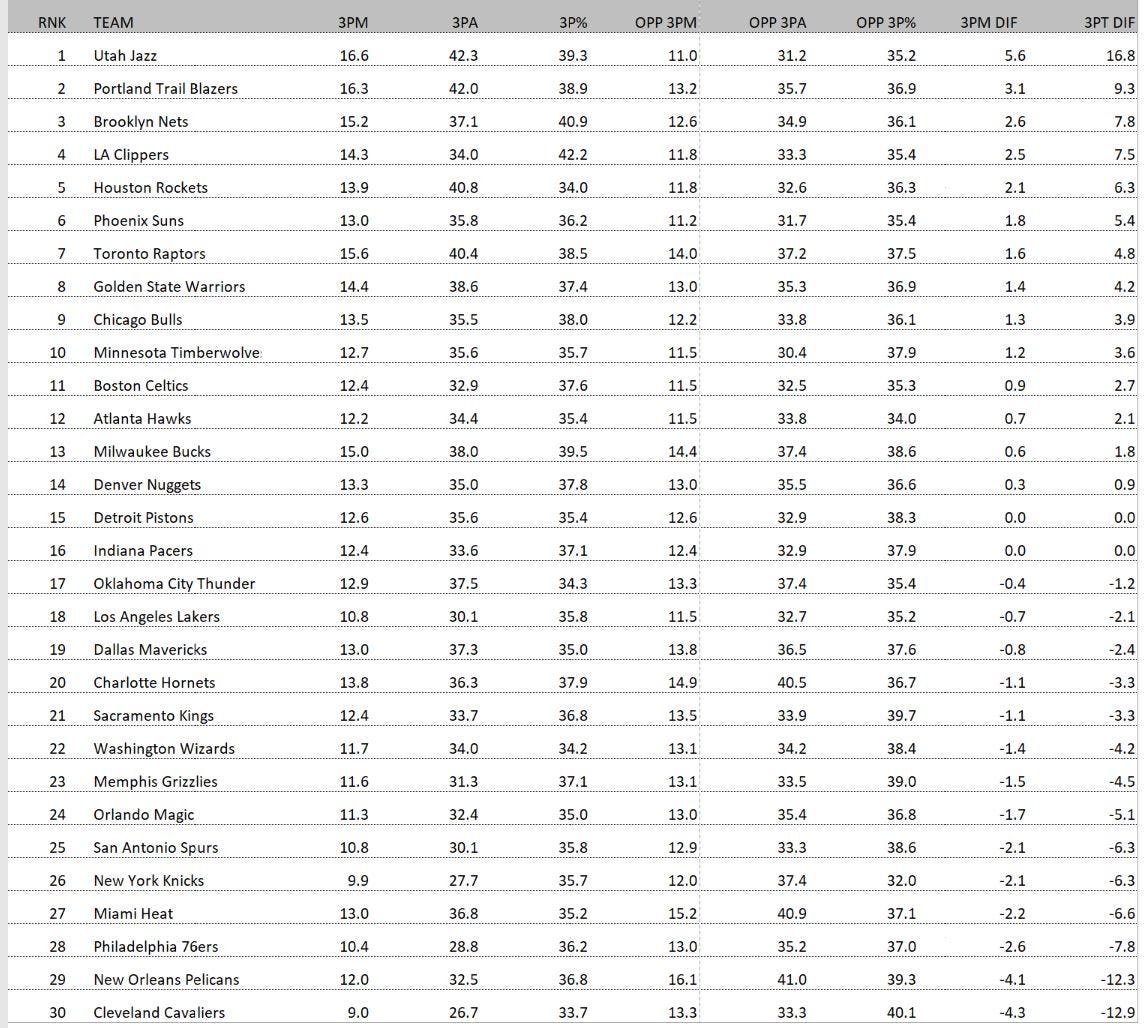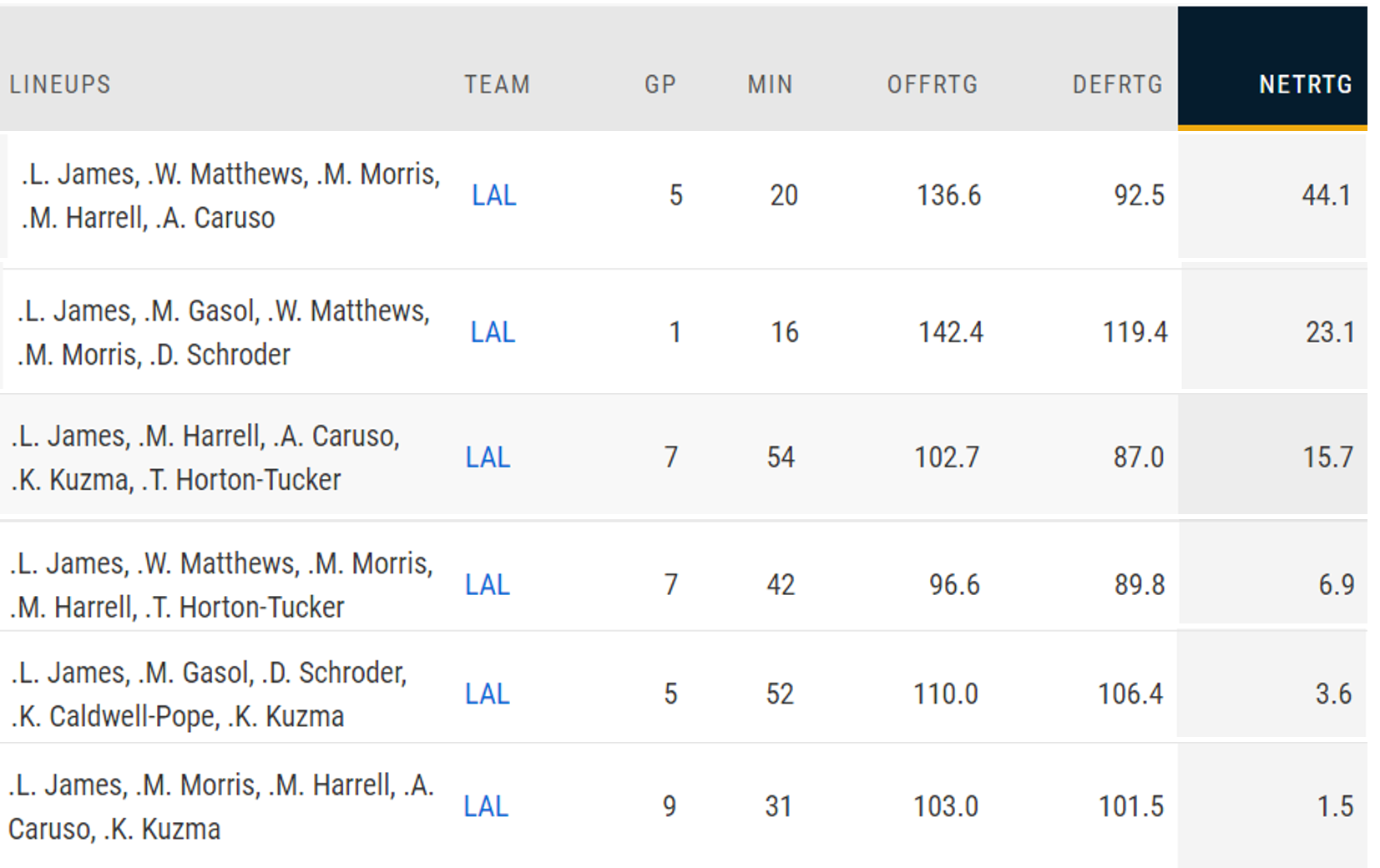The 3-point shooting revolution has taken a sudden change this year that threatens the Los Angeles Lakers’ chances of repeating as champions. The key metric to winning games has suddenly become the 3-point differential.
NBA teams are not only focusing on taking and making more threes than opponents but also on playing better perimeter defense to limit opponent takes and makes and to generate an insurmountable 3-point differential. Suddenly, the 3-point differential has become the preeminent box score stat that determines who wins the game. The modern blueprint for winning in today’s NBA is to outscore your opponent from beyond the 3-point line.
The surprise team leading the league right now are the 24–5 Utah Jazz, who have won 9 straight games and 19 of their last 20. The Jazz also boast the league’s top ranked 3-point differential of 5.6 threes and 16.8 points. The reason the Jazz have the best record in the league is simple. They’re not only making a league best 16.6 made threes per game on 39.3% shooting but also only allowing a league lowest 11.0 made threes per game.
NBA 3-POINT DIFFERENTIAL AS OF FEBRUARY 19, 2021

The Jazz even won the 3-point differential in the only game they lost of the last 20 games, hitting 20 of 47 threes for 42.6%. It took the Denver Nuggets hitting an incredible 18 for 28 threes for 64.3% to give the Jazz a rare loss. The league has been slow to give Quin Snyder and the Utah Jazz credit for being more than an early season surprise but the teams they’ve played understand their combination of 3-point offense and defense is daunting.
With Gobert protecting the rim freeing defenders to challenge threes and a cadre of dead eye shooters raining threes, the Jazz now have the 4th best offensive rating, 2nd best defensive rating, and best net rating in the league.
After making a change in defensive philosophy to prioritize defending the three over protecting the rim, the Lakers only allow 11.5 made threes per game, which is tied for the third fewest opponent threes in the league. Unfortunately, the Lakers only make 10.8 threes per game, 28th in the league, resulting in a negative 3-point differential: they allow 0.7 more threes and 2.1 points per game than they make, 18th out of 30 teams.
Alarmingly, the other three teams with the top four 3-point differentials are also teams the Lakers may end up facing on the road to the championship: the 2nd ranked Blazers, the 3rd ranked Nets, and the 4th ranked Clippers. The Portland Trail Blazers have a scary 3-point differential of 3.1 threes and 9.3 points, the Brooklyn Nets a differential of 2.6 threes and 7.8 points, and the Los Angeles Clippers a differential of 2.5 threes and 7.5 points.
What’s unnerving about the Lakers’ negative 3-point differential is there is limited room to improve defensively, which means the only way to close the gap is offensively, which may be impossible without major roster changes. Changes in the roster may be needed because the Lakers simply do not have the high volume 3-point shooters needed to increase the number of made threes and points generated to create a positive 3-point differential.
Right now, the closest the Lakers have to a high volume 3-point shooter is LeBron who’s taking 6.6 threes per game. Next in 3-point shot attempts are Kuzma with 3.7 per game, KCP with 3.7, Wes with 3.3, and Dennis with 3.1. None of these players, LeBron included, are legitimate volume 3-point shooters. Frankly, if the Lakers want to increase made threes and points, they’re going to need to change their roster and upgrade their offense.
Otherwise, they’re going to see more and more teams dominating them from deep like the Nets did last night, hitting 10 more threes for 30 more points. But they’re going to face a 3-point differentiaL gauntlet this year. The Jazz’ Mitchell and Clarson are averaging 8.7 and 8.6 threes per game, the Blazers’ Lillard and McCollum 10.8 and 11.0, the Nets’ Harden, Irving, and Harris 7.9, 6.8, and 6.6, the Clippers George and Leonard 7.9 and 4.9.
Last regular season, the Lakers took 31.6 threes per game and shot only 34.8%. They improved dramatically in the playoffs, taking 34.2 threes and shooting 35.4%. Defensively, they allowed 32.7 opponent threes per game. They made 12.1 threes and allowed 11.8 opponent threes in the playoffs, giving them a differential of 0.3 threes and 0.9 points. So it’s not impossible for the Lakers to win a championship with a low 3-point differential.
But the Lakers’ options are still limited. To start with, they need to make some basic changes in their offense to create more open threes and they need to encourage their players to take those shots when they’re available. Their 3-point attempts have declined over 10% the last 15 games. They took 31.9 threes per game the first 15 games but just 28.3 threes per game the last 15 games. While they’ve continued to win, the margin has gotten slim.
The Lakers best option is to look to move low 3-point volume starting guards Dennis Schroder and Kentavious Caldwell-Pope for a pair of high volume 3-point shooters to help improve their 3-point differential. Candidates the Lakers could target include Buddy Hield (10.3 3PG), Malik Beasley (8.7 3PG), Devonte Graham (8.1 3PG), Lonzo Ball (7.6 3PG), JJ Redick (4.6 3PG), Lauri Markkanen (7.2 3PG), Victor Oladipo (7.3 3PG).
The Lakers’ 3-point differential depends more on the volume than the percentage of threes made. While it’s not impossible for the Lakers to repeat as champions, their negative 3-point differential will make that difficult. The last thing they want is to play the four teams who have the best 3-point differentials in the league: Blazers in the first round, Clippers in the second round, Jazz in the conference finals, and then the Nets in the Finals.
The good news is the Lakers will have an opportunity at the trade deadline for moves to improve their rim protection and 3-point shooting. Let’s hope they recognize their negativer 3-point differential is their Achilles heel.
